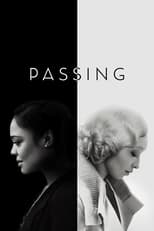Manuel São Bento
Jan 31, 2021
7/10
If you enjoy reading my Spoiler-Free reviews, please follow my blog @
https://www.msbreviews.com
Black-and-white films are something I'll always cherish, but when these two colors become part of the narrative itself, then I can only expect a great movie. Passing approaches the fear of being colored due to obvious reasons of the film's period, and it does so in a necessarily disturbing, emotionally investing manner. Tessa Thompson (Irene) plays in the colored side while Ruth Negga (Clare) enjoys the privileges of passing as white. A captivating story unravels with Irene and Clare feeling envious of each other. If the former desires the latter's (external) happiness, Clare feels terrible for not possessing the same principles and morals as Irene.
While I feel much more empathy for Irene's pride in being colored, I also don't blame Clare for getting a better life without all the discrimination. Both have their own personal problems, but as their friendship grows larger and more significant, these issues also expand and become seriously hurtful, especially to Tessa's character. The narrative loses a bit of steam when it starts focusing on romantic jealously instead of the interracial matter. The passage of time occasionally feels too abrupt and slightly confusing. Finally, the ending doesn't do justice to the movie's central theme and title, almost completely forgetting what it was supposed to communicate to the audience.
Nevertheless, it's still a marvelous film with a meaningful storytelling purpose. As expected, Tessa and Ruth deliver brilliant performances, boasting a charming, dynamic, even passionate chemistry, but André Holland, Alexander Skarsgård, and the always remarkable Bill Camp also prove their worth. The B&W transmits a beautiful message concerning the lack of importance of someone's color (in B&W, everyone looks the same), and the significant value of morals and principles that truly define a person. As her feature directorial debut, Rebecca Hall undoubtedly shows talent, but she'll need to learn that "less is more". Gorgeous, elegant cinematography from Edu Grau.
Passing is a solid feature directorial debut for Rebecca Hall, but she must learn to focus on just one central theme. Otherwise, such a beautifully shot movie boasting outstanding performances will lose its precious message in the middle of so many irrelevant, superficial romantic endeavors. Tessa Thompson and Ruth Negga carry the plot forward with charm and elegance, as does everyone else in the cast, but these two share such remarkable chemistry that I feel that the slow pacing was actually quite adequate. While the main plot revolves around the "passing as white" debate, I couldn't feel more engaged by the narrative and its opposite-sided main characters. However, this fascinating matter gradually loses energy, ultimately fading completely to an underwhelming jealously story between women, culminating in a climax that feels slightly out-of-place and exaggerated. Still, it's more entertaining than I anticipated it to be, and it still leaves the viewers with a very interesting "what if it was me" scenario to think about.
